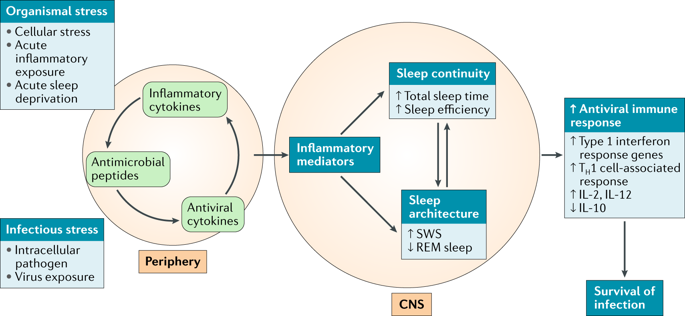Nature Reviews Immunology ( IF 67.7 ) Pub Date : 2019-07-09 , DOI: 10.1038/s41577-019-0190-z Michael R Irwin 1

|
The discovery of reciprocal connections between the central nervous system, sleep and the immune system has shown that sleep enhances immune defences and that afferent signals from immune cells promote sleep. One mechanism by which sleep is proposed to provide a survival advantage is in terms of supporting a neurally integrated immune system that might anticipate injury and infectious threats. However, in modern times, chronic social threats can drive the development of sleep disturbances in humans, which can contribute to the dysregulation of inflammatory and antiviral responses. In this Review, I describe our current understanding of the relationship between sleep dynamics and host defence mechanisms, with a focus on cytokine responses, the neuroendocrine and autonomic pathways that connect sleep with the immune system and the role of inflammatory peptides in the homeostatic regulation of sleep. Furthermore, I discuss the therapeutic potential of harnessing these reciprocal mechanisms of sleep–immune regulation to mitigate the risk of inflammatory and infectious diseases.
中文翻译:

睡眠和炎症:疾病和健康方面的伙伴。
在中枢神经系统,睡眠和免疫系统之间存在相互联系的发现表明,睡眠增强了免疫防御能力,而来自免疫细胞的传入信号促进了睡眠。提出睡眠提供生存优势的一种机制是支持可能预料到伤害和感染威胁的神经综合免疫系统。但是,在现代,慢性社会威胁会推动人类睡眠障碍的发展,从而加剧炎症反应和抗病毒反应的失调。在这篇评论中,我描述了我们目前对睡眠动力学与宿主防御机制之间关系的理解,重点是细胞因子反应,连接睡眠与免疫系统的神经内分泌和自主神经通路以及炎症肽在睡眠体内稳态调节中的作用。此外,我讨论了利用睡眠-免疫调节的这些相互机制来减轻炎症和传染病风险的治疗潜力。









































 京公网安备 11010802027423号
京公网安备 11010802027423号